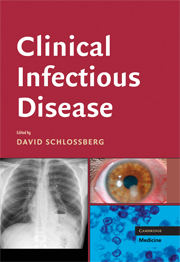Book contents
- Frontmatter
- Contents
- Preface
- Contributors
- Part I Clinical Syndromes – General
- Part II Clinical Syndromes – Head and Neck
- Part III Clinical Syndromes – Eye
- Part IV Clinical Syndromes – Skin and Lymph Nodes
- Part V Clinical Syndromes – Respiratory Tract
- Part VI Clinical Syndromes – Heart and Blood Vessels
- Part VII Clinical Syndromes – Gastrointestinal Tract, Liver, and Abdomen
- Part VIII Clinical Syndromes – Genitourinary Tract
- Part IX Clinical Syndromes – Musculoskeletal System
- Part X Clinical Syndromes – Neurologic System
- Part XI The Susceptible Host
- Part XII HIV
- Part XIII Nosocomial Infection
- Part XIV Infections Related to Surgery and Trauma
- Part XV Prevention of Infection
- Part XVI Travel and Recreation
- Part XVII Bioterrorism
- Part XVIII Specific Organisms – Bacteria
- Part XIX Specific Organisms – Spirochetes
- Part XX Specific Organisms – Mycoplasma and Chlamydia
- Part XXI Specific Organisms – Rickettsia, Ehrlichia, and Anaplasma
- Part XXII Specific Organisms – Fungi
- Part XXIII Specific Organisms – Viruses
- Part XXIV Specific Organisms – Parasites
- 193 Intestinal Roundworms
- 194 Tissue Nematodes
- 195 Schistosomes and Other Trematodes
- 196 Tapeworms (Cestodes)
- 197 Toxoplasma
- 198 Malaria: Treatment and Prophylaxis
- 199 Human Babesiosis
- 200 Trypanosomiases and Leishmaniases
- 201 Intestinal Protozoa
- 202 Extraintestinal Amebic Infection
- Part XXV Antimicrobial Therapy – General Considerations
- Index
200 - Trypanosomiases and Leishmaniases
from Part XXIV - Specific Organisms – Parasites
Published online by Cambridge University Press: 05 March 2013
- Frontmatter
- Contents
- Preface
- Contributors
- Part I Clinical Syndromes – General
- Part II Clinical Syndromes – Head and Neck
- Part III Clinical Syndromes – Eye
- Part IV Clinical Syndromes – Skin and Lymph Nodes
- Part V Clinical Syndromes – Respiratory Tract
- Part VI Clinical Syndromes – Heart and Blood Vessels
- Part VII Clinical Syndromes – Gastrointestinal Tract, Liver, and Abdomen
- Part VIII Clinical Syndromes – Genitourinary Tract
- Part IX Clinical Syndromes – Musculoskeletal System
- Part X Clinical Syndromes – Neurologic System
- Part XI The Susceptible Host
- Part XII HIV
- Part XIII Nosocomial Infection
- Part XIV Infections Related to Surgery and Trauma
- Part XV Prevention of Infection
- Part XVI Travel and Recreation
- Part XVII Bioterrorism
- Part XVIII Specific Organisms – Bacteria
- Part XIX Specific Organisms – Spirochetes
- Part XX Specific Organisms – Mycoplasma and Chlamydia
- Part XXI Specific Organisms – Rickettsia, Ehrlichia, and Anaplasma
- Part XXII Specific Organisms – Fungi
- Part XXIII Specific Organisms – Viruses
- Part XXIV Specific Organisms – Parasites
- 193 Intestinal Roundworms
- 194 Tissue Nematodes
- 195 Schistosomes and Other Trematodes
- 196 Tapeworms (Cestodes)
- 197 Toxoplasma
- 198 Malaria: Treatment and Prophylaxis
- 199 Human Babesiosis
- 200 Trypanosomiases and Leishmaniases
- 201 Intestinal Protozoa
- 202 Extraintestinal Amebic Infection
- Part XXV Antimicrobial Therapy – General Considerations
- Index
Summary
American trypanosomiasis (Chagas disease), human African trypanosomiasis (HAT, sleeping sickness), and leishmaniasis are caused by related protozoa of the family Trypanosomatidae, order Kinetoplastida (see Table 200.1). They have a unique mitochondrial structure, the kinetoplast, are transmitted in nature by insect vectors, and exist in multiple morphologic forms in their human hosts and insect vectors. They are important causes of morbidity and mortality in endemic areas of the world: Chagas disease in South and Central America, sleeping sickness in sub-Saharan Africa, and leishmaniasis in scattered areas on every continent except Antarctica. Although uncommon in industrial countries in North America and Europe, these diseases have been the source of increased attention in recent years. Infection with Trypanosoma cruzi, the cause of Chagas disease, is well documented among a subset of Latin American immigrants to the United States and Canada and poses a risk to them and to recipients of contaminated blood or transplanted organs. Cutaneous leishmaniasis is seen among tourists returning from endemic areas in Latin America and the Middle East as well as in military personnel serving in Iraq and Afghanistan. Canine visceral leishmaniasis has been reported in the United States among foxhounds and other dogs, but to date, humans have not been infected.
Despite several important recent advances, the treatment of Chagas disease, African trypanosomiasis, and leishmaniasis leaves much to be desired. Many of the drugs (Table 200.2) used for them are associated with frequent and potentially severe untoward effects, some require parenteral administration, and many must be administered over prolonged periods of time.
- Type
- Chapter
- Information
- Clinical Infectious Disease , pp. 1389 - 1398Publisher: Cambridge University PressPrint publication year: 2008



